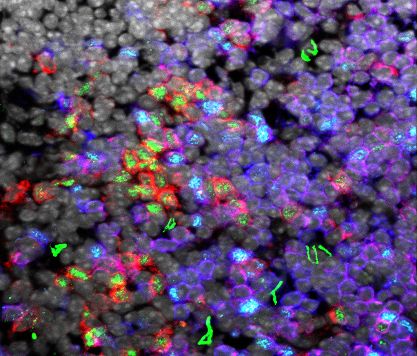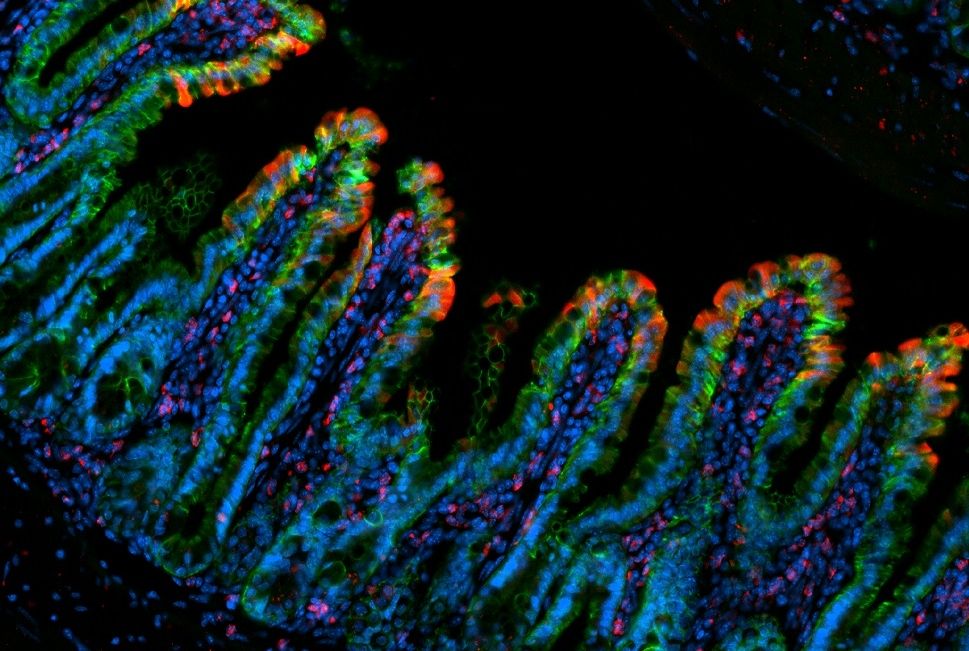
Research
The Sonnenberg Laboratory studies the immune system, which has numerous functions that are essential for human health, while inappropriate immune responses drive chronic inflammatory disorders. Our goal is to advance our understanding of the immune system that will fundamentally advance biomedical research and drive the development of novel therapeutic strategies for human diseases. The only way to accomplish this is to fully define the complex cellular and molecular networks by which the immune system functionally interacts with itself, other mammalian cell types and beneficial or pathogenic microbes. This is the long-term research goal of the Sonnenberg Laboratory, with a focus on driving highly novel advances, innovative expertise, and paradigm-shifting research that requires out-of-the-box ideas and fresh perspectives.
One specific focus is on pathways that regulate a state of health in the mammalian gastrointestinal tract. This is a considerable challenge as this organ system has an enormous surface area that is continuously exposed to dietary antigens, trillions of normally beneficial microbes (termed the microbiota), and frequent pathogens. Therefore, the intestinal immune system must be tolerant to innocuous stimuli, while providing protection from infections. This functional dichotomy could be why the intestine contains the largest and most sophisticated compartment of the mammalian immune system with numerous organized lymphoid structures and complex cellular networks. The Sonnenberg Laboratory has been at the forefront of interrogating novel pathways regulating immunity, inflammation, and tissue health in the mammalian intestine, with a particular focus on emerging families of innate lymphoid cells, dendritic cells, and distinct consortia of microbes.
Figure 1: Group 3 innate lymphocytes (red and green) interacting with microbiota-specific regulatory T cells (blue, green and cyan) in lymphoid tissues.

Figure 2: TNF-driven intestinal inflammation, where the gut epithelial cells (marked by Epcam in green) exhibit substantial cell death (marked by cleaved caspase 3 in red)

Current Projects:
- Innate lymphocytes
- Neuro-immune interactions
- Host-microbiota interactions
- Tumor immunology and immunotherapy
- Chronic inflammatory diseases
Bio
Dr. Sonnenberg completed his doctoral research training at the University of Pennsylvania School of Medicine in 2011. In 2012 and with a NIH Director’s Award, he established the Sonnenberg Laboratory at the University of Pennsylvania. In 2014, Dr. Sonnenberg was recruited as an Assistant Professor of Microbiology & Immunology in Medicine at Weill Cornell Medicine, Cornell University. He was promoted to Associate Professor in 2018 and was appointed the Henry R. Erle, M.D.-Roberts Family Associate Professor of Medicine with tenure in 2022. In 2021, Dr. Sonnenberg became Head of Basic Research in the Gastroenterology & Hepatology at Weill Cornell Medicine and Deputy Editor-in-Chief at Mucosal Immunology.
Distinctions:
- NIH/NIAID MERIT R37 Award (2023)
- American Association of Immunologists (AAI)-BD Biosciences Investigator Award (2023)
- International Cytokine & Interferon Society- Inaugural Luminex John R. Kettman Award (2020)
- Cancer Research Institute Lloyd J. Old STAR Program Award (inaugural year, 2019)
- Burroughs Wellcome Fund Investigator in the Pathogenesis of Infection Disease (2018)
- Society for Mucosal Immunology Inaugural Young Investigator Award (2017)
- Searle Scholar Award (2016)
- NIH Director’s Early Independence Award DP5 (2012)
